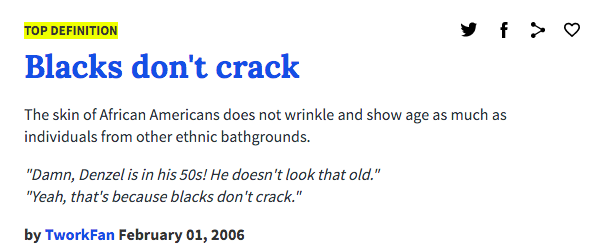The Group of White People Who Really Believe 'Black Don't Crack'

By:
You've probably heard the phrase "Black don't crack" used to describe Black people who look good for their age, usually because they have great skin. But a whopping 42 percent of white second year medical students surveyed think that Black people have thicker skin than white people, according to a study by the University of Virginia.
 Urban Dictionary - urbandictionary.com
Urban Dictionary - urbandictionary.com
Also supporting the "Black don't crack" philosophy, 28 percent of second year medical students surveyed said that they thought Black people aged slower than white people. To be clear, neither of these thoughts about skin thickness or age is a medical fact.
That's why it's so surprising that a group of medical students said that these beliefs were scientifically true, along with several other strange medical myths about Black people. Researchers conducted this study in two parts.
First they surveyed 92 white "laypeople" or non-doctors, and they found that many of them had false misconceptions about Black people and health. They also conducted a survey with 222 medical students and residents. They found that overall half of the medical crowd had false beliefs about black people.
In the even more bizarre category, the study revealed the following:
- 29 percent of white first year medical students believe that Black people's blood clots quicker.
- 18 percent of white second year medical students believe Black people have a more sensitive sense of smell.
- 15 percent of white second year medical students think Black people are better at detecting movement. Yeah, think about that one.
Although the above percentages are strange, the most important misconception is that 14 percent of second year white medical students thought that Black people's nerve endings are less sensitive. This means that this significant percentage of students, who will theoretically become doctors, may think that Black people need less pain medication.
Racial discrimination in the healthcare system.
Dr. René Salazar, the director of diversity in graduate medical education at the University of California, San Francisco told CNN that racial bias in medical care is real and it's an important issue. "A lot of folks come to San Francisco thinking, 'Oh it's such an open-minded place, there are no biases here,'" he said. "That's not true. You're going to see this in every hospital. It's going to be an issue."
There is a significant body of research to back that up. A study by Case Western University said that doctors were less likely to prescribe pain killers for migraines and back pain to Black patients even when the doctors rated their pain similar to whites.
A different study from the University of California in San Diego tested the perceptions of medical students and they were more likely to think that a Black woman is unhealthy than a white man with the same symptoms. Also a study from the University of Albany found that doctors tend to think more negatively of Black and low-income patients in regards to intelligence, personality, and behavior.
